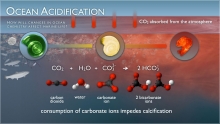- You are here:
- GT Home
- Sciences
- Home
- List of Available Research Projects
Deep subsurface methane hydrate-bearing sediments contain microbial communities that are distinct from shallow marine sediments and hydrate-free environments. DNA evidence suggests that novel bacterial phyla (e.g. Atribacteria) are highly enriched in methane hydrate-bearing sediments. Recent genome assemblies by the Glass group at Georgia Tech are providing insights into the metabolic potential of samples drilled from gas hydrate stability zone 70 mbsf below Hydrate Ridge (IODP Leg 204).
CO2 emission will continue exaggerating, as fossil fuels will most likely remain the major source of energy in next couple decades. The increased carbon in the atmosphere moves into marine ecosystems, making the world’s oceans more acidic. The rate of ocean acidification (OA) today is faster than any time in the past 300 million years.



